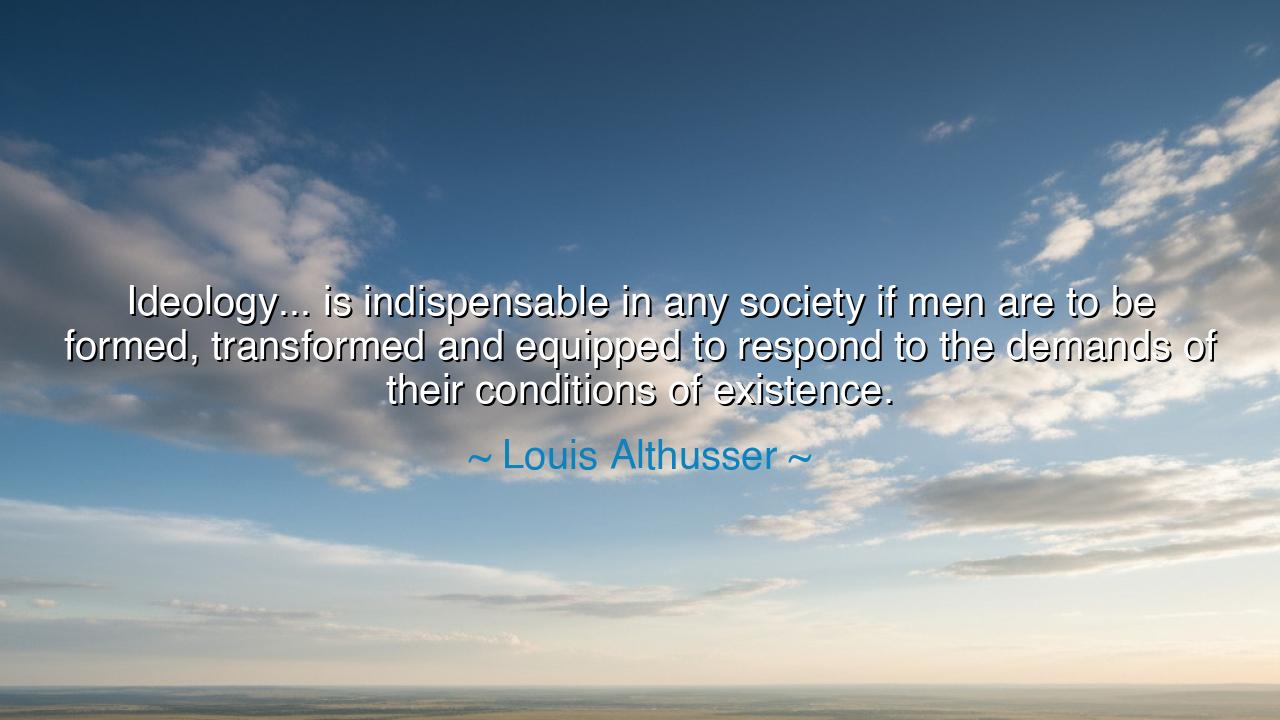
Ideology... is indispensable in any society if men are to be
Ideology... is indispensable in any society if men are to be formed, transformed and equipped to respond to the demands of their conditions of existence.






Louis Althusser, the philosopher who gazed deeply into the hidden machinery of power, once wrote: “Ideology… is indispensable in any society if men are to be formed, transformed and equipped to respond to the demands of their conditions of existence.” In this utterance, he revealed not only a truth of his age but of all ages: that human beings are never born into a void. We awaken always into systems of meaning, into beliefs, into stories that tell us who we are, what is good, and how we must act. These stories—whether we call them faith, tradition, patriotism, or progress—are the ideologies that bind and shape us.
The meaning of his words is profound. Ideology is not merely propaganda or falsehood, though it may contain both. It is the very fabric of shared understanding that makes a society possible. It forms us when we are young, teaching us language, morals, and duty. It transforms us as we grow, challenging us to adapt to new roles, whether as workers, citizens, or parents. And it equips us by providing the framework through which we respond to life’s hardships—the wars, the struggles for justice, the crises of survival. Without ideology, Althusser reminds us, men and women would drift without compass, unable to stand together against the demands of existence.
History bears witness to this. Consider the French Revolution. When the monarchy crumbled, it was not enough to remove a king; a new ideology had to arise to form the people anew. The cries of “liberty, equality, fraternity” became not just slogans but the moral compass of a transformed nation. Those words, though imperfectly lived, equipped men and women to endure chaos, to imagine a new order, to answer the brutal conditions of poverty and tyranny with a vision of justice. Without that ideological fire, the people would have remained scattered, unable to act as one.
Or look to the civil rights movement in America. The oppressed could have lived and died in silence, bowed beneath segregation. But a new ideology rose—one that proclaimed dignity, equality, and freedom as not merely dreams but rights. This ideology, preached from pulpits and sung in marches, formed a generation of activists, transformed the hearts of onlookers, and equipped them with courage to face dogs, fire hoses, and jail cells. In this way we see that Althusser’s truth is not abstract: it is lived in blood and song, in law and sacrifice.
Yet Althusser also warns us by implication: because ideology is indispensable, it can also be dangerous. Tyrants too understand this, and they forge ideologies of fear, hatred, and false unity to form and equip their people not for justice, but for war and oppression. Nazi Germany, with its ideology of racial supremacy, provides the darkest example. There, ideology did not free men but enslaved their minds, transforming neighbors into enemies and equipping ordinary citizens to commit unspeakable crimes. The same power that can raise up can also destroy.
The lesson, then, is not to reject ideology, for we cannot live without it, but to choose it wisely. Ask always: does this belief form me into a greater human being? Does it transform me toward compassion, justice, and courage? Does it equip me to endure hardship with honor, to serve not only myself but my community? If ideology narrows your heart, if it arms you with hatred, then it is false fire. But if it expands your vision, if it strengthens your resolve to meet the demands of life with dignity, then it is a flame worth tending.
Practical action lies before us: read deeply, question fearlessly, and measure every creed not by its words alone but by its fruits. Support ideologies that build bridges, not walls; that awaken conscience, not slumber; that prepare the people to meet their existence not in despair, but in courage. Teach children not only the myths of the past but also the values of justice, kindness, and perseverance. For in this way, ideology becomes not a chain, but a compass, guiding us through the storms of history.
Thus let Althusser’s words be carried forward: “Ideology is indispensable in any society.” Do not fear this truth, but master it. For if we learn to shape our ideologies wisely, they will form us as heroes, transform us as healers, and equip us as builders of a future worthy of those yet to come.






AAdministratorAdministrator
Welcome, honored guests. Please leave a comment, we will respond soon